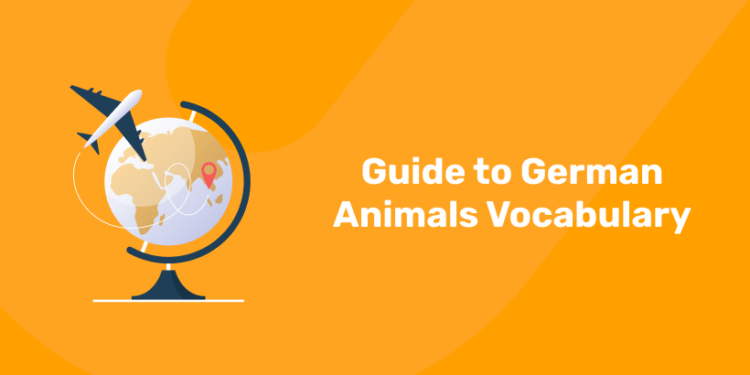Table of Contents
Learning a new language is not just about mastering grammar and sentence structures; it’s also about diving into the culture and lifestyle of the people who speak it. German, a language rich in history and nuances, has a diverse and exciting vocabulary, and one of the most engaging aspects of language learning is building vocabulary around common themes such as animals. Animals play an essential role in everyday conversations, cultural references, and even idiomatic expressions in German.
German Animals Vocabulary – Insights
Whether you’re a traveler, a pet owner, or just an animal lover, learning the German words for different animals is a step toward gaining a deeper understanding of the language. German animal vocabulary is vast, covering everything from domestic pets like dogs and cats to wild animals, farm animals, marine life, and even insects. This guide will help you explore the most common German animal terms, offering valuable insights into their meanings and usage, as well as tips on how to retain them effectively.
German Animals Vocabulary – Top Lists
1: How do you say "Good Morning" in German?
1. Domestic Animals (Haustiere)
German-speaking people often love talking about their pets. Whether it’s a dog, cat, or rabbit, pets are a frequent topic in everyday conversation. Here are some of the most commonly used terms for domestic animals:
| German | Phonetic | English | Example Sentence |
|---|---|---|---|
| Hund | [hoont] | Dog | Mein Hund liebt es, im Park zu laufen. (My dog loves running in the park.) |
| Katze | [kaht-ze] | Cat | Meine Katze schläft den ganzen Tag. (My cat sleeps all day.) |
| Vogel | [foh-gel] | Bird | Der Vogel singt jeden Morgen. (The bird sings every morning.) |
| Kuh | [koo] | Cow | Die Kuh gibt frische Milch. (The cow gives fresh milk.) |
| Pferd | [fay-ert] | Horse | Sie reitet gern auf ihrem Pferd. (She enjoys riding her horse.) |
| Kaninchen | [kah-nin-shen] | Rabbit | Das Kaninchen frisst gerne Karotten. (The rabbit loves eating carrots.) |
2. Wild Animals (Wildtiere)
German vocabulary also includes a wide array of wild animals, many of which hold a place of cultural significance in German traditions and folklore.
| German | Phonetic | English | Example Sentence |
|---|---|---|---|
| Löwe | [luh-veh] | Lion | Der Löwe ist der König des Dschungels. (The lion is the king of the jungle.) |
| Tiger | [tee-ger] | Tiger | Ein Tiger kann sehr schnell rennen. (A tiger can run very fast.) |
| Bär | [behr] | Bear | Der Bär schläft im Winter. (The bear hibernates in winter.) |
| Wolf | [volf] | Wolf | Der Wolf heult in der Nacht. (The wolf howls at night.) |
| Elefant | [eh-leh-fant] | Elephant | Der Elefant ist das größte Landtier. (The elephant is the largest land animal.) |
3. Marine Animals (Meerestiere)
German is rich in vocabulary for marine life as well, which can be especially useful for those who are exploring German in coastal or aquatic contexts.
| German | Phonetic | English | Example Sentence |
|---|---|---|---|
| Wal | [vahl] | Whale | Der Wal ist ein großes Meerestier. (The whale is a large sea animal.) |
| Hai | [hi] | Shark | Der Hai schwimmt schnell. (The shark swims fast.) |
| Seehund | [zey-hund] | Seal | Der Seehund spielt im Wasser. (The seal plays in the water.) |
| Krabbe | [kra-buh] | Crab | Die Krabbe läuft seitwärts. (The crab walks sideways.) |
4. Insects (Insekten)
The German language includes a variety of vocabulary to describe insects, which is useful when discussing nature, gardens, or the environment.
| German | Phonetic | English | Example Sentence |
|---|---|---|---|
| Biene | [bee-nuh] | Bee | Die Biene sammelt Pollen. (The bee collects pollen.) |
| Schmetterling | [shmet-er-ling] | Butterfly | Der Schmetterling fliegt im Garten. (The butterfly is flying in the garden.) |
| Ameise | [ah-my-ze] | Ant | Die Ameise trägt einen Krümel. (The ant carries a crumb.) |
| Käfer | [kay-fer] | Beetle | Der Käfer krabbelt auf dem Baum. (The beetle crawls on the tree.) |
Get the best mentors to learn German! Join Entri Elevate German language course!
5. Farm Animals (Nutztieren)
In Germany, farm animals are often part of conversations about rural life, agriculture, and even food production. Here’s a selection of important farm animals:
| German | Phonetic | English | Example Sentence |
|---|---|---|---|
| Huhn | [hoon] | Chicken | Das Huhn legt ein Ei. (The chicken lays an egg.) |
| Ente | [en-teh] | Duck | Die Ente schwimmt im Teich. (The duck swims in the pond.) |
| Gans | [gans] | Goose | Die Gans fliegt südwärts. (The goose flies south.) |
Free German A1 Mock Tests – Powered by AI!
Test your skills on our interactive platform. Get instant feedback from our AI to help you communicate better and track your progress. Start your free German mock test now.
Test Your German A1 for FreeGerman Animals Vocabulary – Tips and Tricks
Mastering German animal vocabulary is a rewarding endeavor, but it can take time and practice. Here are some tips to help you commit these terms to memory and start using them effectively in your conversations:
1. Personalize Your Learning
Associate each animal with your personal experiences. For instance, think of your own pet dog when you learn the word Hund. Visualizing or even speaking aloud about animals you know will make the vocabulary more memorable.
2. Flashcards for Reinforcement
Flashcards are a tried-and-true method for memorization. Use a tool like Quizlet to create flashcards for animals and include an image alongside the German term and its phonetic pronunciation. You can then test yourself daily to improve retention.
3. Watch Documentaries and Nature Shows in German
There are plenty of German documentaries and wildlife programs that feature animals in their natural habitat. Watching these shows helps reinforce the animal vocabulary in context and makes it easier to understand how to use them in conversation.
4. Engage in Conversations with Native Speakers
Practice speaking with native German speakers to reinforce your vocabulary. Ask questions about animals, share your thoughts on wildlife, or discuss pets. The more you use the words in real conversations, the quicker you’ll master them.
5. Use the Vocabulary in Writing
Writing short stories or journal entries about animals is a fun and effective way to practice. Describe an encounter with a wild animal or tell a story about your pet using the new vocabulary you’ve learned.
Conclusion
Learning German animal vocabulary is not only an essential aspect of mastering the language but also a gateway into understanding the German culture, lifestyle, and values. Animals hold a deep cultural significance in German-speaking regions, and the words used to describe them carry a lot of meaning. By following the tips provided, such as using flashcards, watching German media, and engaging with native speakers, you’ll be able to improve your vocabulary retention and usage. In addition, using the resources mentioned will ensure you have plenty of opportunities to expand your knowledge.
And remember, if you’re serious about mastering German and building your vocabulary, consider enrolling in language courses that provide structured learning. Entri, for instance, offers a variety of courses, including German language courses designed for different levels of proficiency. These courses focus not only on vocabulary but also on practical language use, helping you speak confidently in real-world situations.
Free German A1 Mock Tests – Powered by AI!
Test your skills on our interactive platform. Get instant feedback from our AI to help you communicate better and track your progress. Start your free German mock test now.
Test Your German A1 for FreeFrequently Asked Questions
What are some basic German animal vocabulary words I should learn first?
Some essential German animal vocabulary includes Hund (dog), Katze (cat), Pferd (horse), Vogel (bird), and Kuh(cow). These words cover common domestic and farm animals, making them a great starting point for beginners.
How can I remember German animal names more effectively?
You can use flashcards, engage in language exchanges, watch German nature documentaries, and create associations between the animals and personal experiences. Additionally, writing sentences and using the vocabulary in context will help reinforce the terms.
Are there any differences between the vocabulary used in German-speaking countries for animals?
While the animal names themselves remain largely consistent across German-speaking regions, there may be slight regional variations or colloquial terms. For instance, Biene (bee) might also be called Honigbiene (honeybee) in some contexts.











